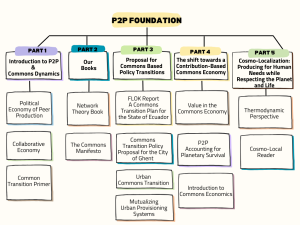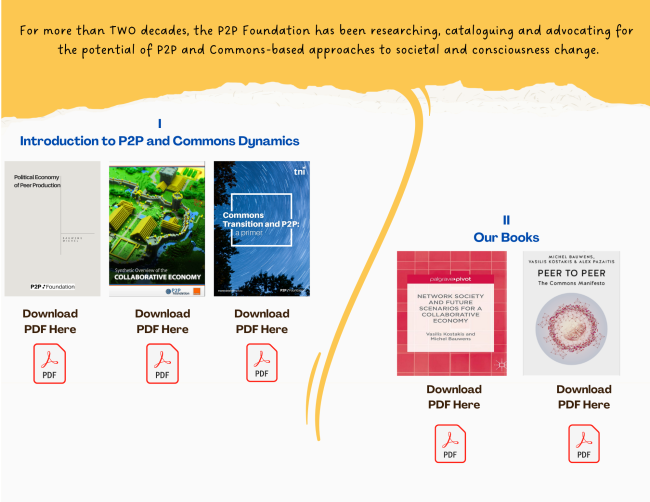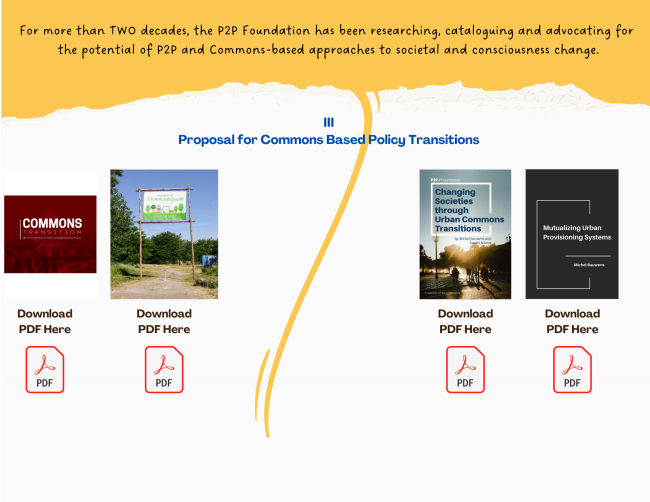User:MDEE/Test
Test Page images

I. Introduction to P2P and Commons Dynamics
1.Political Economy of Peer Production. Bauwens, M. (2005). The Political Economy of Peer Production. CTheory. PDF
This is the foundational text that offers the definition and first analysis of the meaning of the emergence of peer production, and what it means for our human society and productive capacity. Peer production is essentially about ‘trans-local’ self-organization, a new capacity of humanity to coordinate voluntary work at a global scale. We ask the question of how this new capacity relates to the institutions and practices of the market, capitalism, and the state.
Keywords: #PeerProduction #CollaborativeEconomy #CommonsTheory #DecentralizedGovernance
2.Synthetic Overview of the Collaborative Economy. Bauwens, M.et al. (2012). Synthetic Overview of the Collaborative Economy. P2P Foundation & Orange Labs. PDF
In this report we explore the full set of collaborative economic practices that co-emerged with the internet and the web,, such as: commons-based peer production (Yochai Benkler), wikinomics (Don Tapscott), crowdsourcing (Jeff Howe), open innovation (Henry Chesbrough), and collaborative consumption (Rachel Botsman). We ask: how do these new horizontal practices impact hierarchical corporations and the global economy.
Keywords: #CollaborativeEconomy #PeerProduction #OpenInnovation #CommonsEconomics
3.Commons Transition Primer. Bauwens, M.et al. (2017). Commons Transition and P2P: A Primer. Transnational Institute (TNI) and P2P Foundation. PDF
In this simplified and illustrated presentation, we summarize the principles and practices of the commons, especially as to how it affects the state and market. The work presents a pioneering transition program that outlines this transformation in political and policy terms, based on the experiences of the P2P Foundation advising the Ecuadorian government, and the city of Ghent.
Keywords: #CommonsTransition #P2PEconomy #SocialGovernance #OpenCooperativism
II. Our Books
1.Network Theory Book. Kostakis, V. and Bauwens, M., (2014). Network Society and Future Scenarios for a Collaborative Economy. Palgrave Macmillan. PDF
This was the first published book of P2P Foundation authors, in which we outline four potential scenarios for the emergent networked society.
In the first scenario, based on the centralized extraction of peer to peer dynamics in false commons, large corporations extra our data and attention, extracting rent from our own collaboration and exchanges.
In the second scenario, based on the emerging world of crypto and web3, the world and its infrastructures are design to that every citizen becomes an entrepreneur, potentially liberated from the control of big government and big finance
In the third scenario, bottom-up urban and rural commons projects, take control of the provisioning and use of food, transport, housing, etc .. based on the potential of p2p and commons dynamics
In the fourth scenario, global digital commons of knowledge, software and design, create common knowledge and cooperation protocols that allow local projects to scale and cooperate globally.
Bear in mind that these are four worlds that are co-emerging and mixing as we speak, but this is in our view the great ‘infrastructural’ struggle of our age. Which scenario will prevail?
Keywords: #NetworkSociety #CollaborativeEconomy #PeerToPeer #FutureEconomics
2.The Commons Manifesto. Bauwens, M et al. 2019. Peer to Peer: The Commons Manifesto. London: University of Westminster Press. PDF
What is peer to peer? Why is it essential for building a commons-centric future? How could this happen? These are the questions this book tries to answer. Peer to peer (P2P) is a type of social relations in human networks, as well as a technological infrastructure that makes the generalization and scaling up of such relations possible. We believe that these four aspects will profoundly change human society. P2P ideally describes systems in which any human being can contribute to the creation and maintenance of a shared resource while benefiting from it. There is an enormous variety of such systems: from the free encyclopedia Wikipedia to free and open-source software projects, to open design and hardware communities, to relocalization initiatives and community currencies. Thus, P2P enables a new mode of production and creates the potential for a transition to a commons-oriented economy.
Keywords: #UrbanCommons #ParticipatoryGovernance #EcologicalEconomy #PublicCommonsPartnership

III. Proposal for Commons Based Policy Transitions
1.Commons Transition Plan (FLOK version). Bauwens, M et al. (2014). The FLOK Report: A Commons Transition Plan for the State of Ecuador. P2P Foundation.PDF
In 2014, three Ecuadorian institutions asked to craft a transition plan towards a commons-centric knowledge society. With a team of six researchers, and after extensive consultations with political and social forces in Ecuador, several reports were published for transitioning different sectors of the Ecuadorian economy and society. Answering such questions as: which knowledge commons should be enabled for the agriculture, educational, industrial sectors, etc …
Keywords: #SocialKnowledge #CommonsEconomy #PeerToPeerPolicy #PartnerState
2.Commons Transition Plan for the City of Ghent. Bauwens, M., & Onzia, Y. (2017). Commons Transition Plan for the City of Ghent. P2P Foundation. PDF
In the spring of 2016, the mayor and the city council of Ghent, a city in northern Belgium (the Flanders), asked to craft a commons transition plan for the city. We mapped over 500 initiatives, inquired with 80 founders and leaders of such communities, and held 9 thematic workshops to coalesce their proposals in an integrated plan.
Keywords: #UrbanCommons #SocialEcologicalTransition #CivicEngagement #PublicCommonsPartnerships
3.Changing Societies through Urban Commons Transitions. Bauwens, M., & Niaros, V. (2017). Urban Commons Transitions. P2P Foundation in cooperation with Heinrich-Böll-Stiftung. PDF
This report explores the revival of urban commons through both grassroots citizen initiatives and innovative municipal administration, focusing on the new regulatory and cooperative arrangements but citizen groups and the public administrations.. It begins by examining the historical and contemporary relationship between cities and the commons, emphasizing the importance of urban commons for achieving a social-ecological transition. The report reviews various grassroots initiatives in both the global north and south, but with a special focus on municipal coalitions in Barcelona, Bologna, Naples, Frome, Ghent, as well as Seoul. It concludes by proposing an institutional framework to support urban commons transitions, addressing how cities can meet new citizen demands, facilitate social-ecological transitions, and implement institutional adaptations to support these roles.
Keywords: #CommonsEconomy #UrbanCommons #PeerProduction #ContributiveEconomy
4.Mutualizing Urban Provisioning Systems Bauwens, M. Kranjc, R & Ramos, J. (2022). Commons Economies in Action. Chapter 16: Sacred Civics, Building Seven Generation Cities. Earthscan. PDF
A review of municipal policies in favor of individual and collective autonomy, through citizen-centric commons initiatives. It updates and expands on previous reports, looking at regulatory innovations such as partner cities, the Bologna Regulation for the Care and Regeneration of Urban Commons, the quintuple helix governance models in Italy, the promotion of a sharing economy in Seoul, etc ..
Keywords: #Contributory Value ; #Commons Economics ; #P2P Accounting

IV. The shift towards a Contribution-Based Commons Economy
1.Value in the Commons Economy. Bauwens, M., & Niaros, V. (2017). Value in the Commons Economy. P2P Foundation, co-published with Heinrich-Böll-Stiftung. PDF
Our world faces significant questions about the evolution of value, especially in the context of resource allocation in human societies. This is particularly relevant in our increasingly digitalized and networked societies where knowledge commons play a vital role. Key questions include: What constitutes value in these contexts? How should value be defined in a world with ecological and resource constraints? Can a new value system incorporate diverse social, cultural, and institutional values that are often overlooked by traditional systems?
Keywords: #Distributed Ledgers ; #P2P Accounting; Perma-Circularity ; #Protocol Cooperatives; #Thermodynamic Accounting; #Multi-Capitalism
2.P2P Accounting for Planetary Survival. Bauwens, M. & Pazaitis A. (2019). P2P Accounting for Planetary Survival: Towards a P2P Infrastructure for a Socially Just Circular Society. Foreword by Kate Raworth. P2P Foundation. PDF
With the creation of a universal ledger, i.e. originally the blockchain associated with the creation of the Bitcoin currency, we now have an open global accounting system which can allow multiple agents to coordinate their economic and social and labor activities in a shared system. This is in contrast to the closed accounting systems of corporations and states, which are only able to see their own profit, but not the impact on ecosystems and human and non-human communities. In addition, the peer production and crypto networks that are using these new methods of economic coordination are inventing a new accounting system that can account for 1) contributory value and negative impact ; 2) the real thermo-dynamic, i.e. matter and energy flows, and 3) how their transactions take place in a open collaborative network. This is creating a economic and societal revolution that allows for ‘context-based sustainability’., allowing human groups and individuals to make decisions that take into account the natural limits of the planet.
Keywords: #Commons Economics ; #Thermodynamics of Peer Production ; #Biophysical Economy; #Resource-Balanced Economy ; #Contributory Economy ; #Valuing Care
3.Introduction to Commons Economics Bauwens, M. Kranjc, R & Ramos, J. (2022). Introduction to Commons Economics. P2P Foundation. PDF
This report outlines ‘principles of operation’ that should be at the basis of a new type of economics that takes into account the natural economy, abundant, renewable and self-growing resources, and not just scarce resources subject to a tension between supply and demand. Commons economics should be 1) biophysical 2) based on ‘abundance’ engineering rather than scarcity engineering 3) recognize contributions (and impact), 4) recognize commons-based practices and institutions, etc … For each of these seven principles we highlight really existing examples undertaken by pioneering production communities.
Keywords: #Thermodynamics of Peer Production ; #Biophysical Accounting ; #Resource-Balanced Economy ; #Commons Economics
V. Cosmo-Localization: Producing for Human Needs while Respecting the Planet and Life >
1.Thermodynamic Perspectives on Peer to Peer and the Commons as a Path Towards Transition. Piques, C. & Rizos, X. (2017). Peer to Peer and the Commons: a path towards transition. A matter, energy and thermodynamic perspective. P2P Foundation. PDF
The first volume of this research explores how scientists and thinkers have come to realize that thermodynamics teaches us that economic theory must take into consideration the constraints of our ecosystem. It also articulates why contrary to what classical economics implies, the possibility to decouple growth from resource use is a myth, and why the commons and commons-based peer production are the right paradigms for the new economy. The second volume surveys current practices in agro-economics and the dynamics of resource replenishment. It is also a basis for undertaking a future structural analysis of the thermodynamics of relocalization. It shows scenarios applied to food and fiber, non-renewable resources, and energy, how the commons economy helps us overcome the impasse of unlimited growth.
Keywords: #Cosmo-Localism ; #Subsidiarity of Material Production ; #What is heavy is local, what is light is global and shared
2.Cosmo-Local Reader. Bauwens, M. et al. (2021). Cosmo-Local Reader. P2P Foundation / Futures Lab. PDF
“‘What is heavy is local and what is light is global and shared’. This is the new principle of production which combines localized and mutualized production for human need, with cooperation at the global scale through knowledge commons. This report presents 40 global case studies of applications of this principle in really-existing projects, but also a historical and theoretical perspective of why this is a necessary next step for human civilization. It contains the seminal essay, The Pulsation of the Commons which highlights the crucial historical role of the commons as regenerative institution.
Keywords:

Access to the key essay:
Placing the Commons in a Temporal Framework: The Commons as a Planetary Regeneration Mechanism. By Michel Bauwens and Jose Ramos. URL = https://wiki.p2pfoundation.net/Pulsation_of_the_Commons